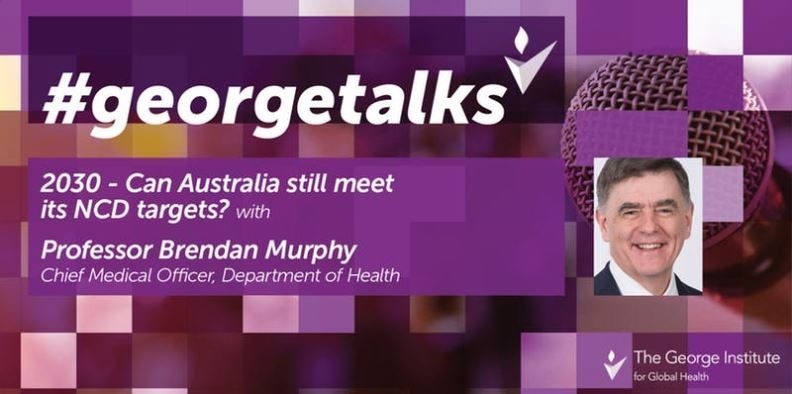
2030 - Can Australia still meets its NCD targets

The Lancet Taskforce on Non-Communicable Diseases (NCDs) and economics reported that Australia, along with half of countries around the world, will not reach its World Health Organization 2030 targets to reduce NCDs.
You are invited to join a special in-depth conversation Professor Brendan Murphy, Chief Medical Officer, Department of Health, and Professor David Peiris, Director of Health Systems Science, The George Institute for Global Health to explore these questions and other topics including primary care, new models of care, and social determinants of health, and questions raised during a Q & A with the audience.
On present trends, Australia will hit the goal of a one-third reduction in these deaths after 2040 for women, while the male target is expected to be reached between 2031 and 2040.
How do we accelerate Australia’s progress to meet its NCDs targets by 2030?
- What priority reforms are needed across the health system to prevent and manage rising rates of NCDs?
- How do we close the inequity gaps in our health system?
- What did the recent UN High Level Meeting on NCDs show us about the global challenges and opportunities for addressing NCDs?
Click here for tickets
The George Institute is a regular convener of independent health policy forums with key policy makers to facilitate robust conversation on Australia’s biggest health challenges and opportunities.
Light breakfast & networking opportunity on arrival.
Limited spaces – RSVP by 14 November 2018.
Cost – $20.00 The George Institute is a not-for-profit, independent medical research Institute. This charge will help cover costs of convening this event.
Professor Brendan Murphy – Chief Medical Officer, Department of Health
Professor Brendan Murphy is the Chief Medical Officer for the Australian Government and is the principal medical adviser to the Minister and the Department of Health. He also holds direct responsibility for the Department of Health’s Office of Health Protection and the Workforce Division. Apart from the many committees he chairs, co-chairs and participates, he is the Australian Member on the International Agency for Research on Cancer (IARC) Governing Committee and represents Australia at the World Health Assembly. Prior to his appointment Professor Murphy was the Chief Executive Officer of Austin Health in Victoria.
He was formerly CMO and director of Nephrology at St Vincent’s Health, and sat on the Boards of Health Workforce Australia, the Florey Institute of Neuroscience and Mental Health, the Olivia Newton-John Cancer Research Institute and the Victorian Comprehensive Cancer Centre. He is also a former president of the Australian and New Zealand Society of Nephrology. Professor Murphy is a Professorial Associate with the title of Professor at the University of Melbourne and an Adjunct Professor at Monash University, a Fellow of the Australian Academy of Health and Medical Sciences, a Fellow of the Royal Australian College of Physicians and Australian Institute of Company Directors.
Professor David Peiris – Director of Health Systems Science, The George Institute for Global Health
David is Director of Health Systems Science, a Professor in the Faculty of Medicine, UNSW Sydney and a practising GP. David joined the Institute in 2006 and directs the newly formed Centre for Health Systems Science. Health systems science is a dynamic and emerging discipline that includes health services research, health policy and systems research and implementation science. The goal of the Centre is to overcome the challenges of delivering affordable, high quality health services and programs to communities across the globe. David has published extensively in areas related to health systems research and leads several grants testing innovative strategies to improve access to high quality primary health care in Australia, India and China with a particular focus on under-served populations. He was previously a NHMRC Translating Research into Practice Fellow and is currently an NHMRC Career Development Fellow.
He was the 2015-2016 Australian Harkness Fellow in Healthcare policy, based at Harvard School of Public Health and conducted a national study of the changes to health care delivery systems associated with President Obama's reforms. He has been a board member with the Royal Australian College of General Practitioners National Faculty of Aboriginal and Torres Strait Islander Health and sits on several government, non-government and research advisory committees. He was also the elected co-chair of the Global Alliance for Chronic Diseases committee for hypertension control from 2012 to 2015.


